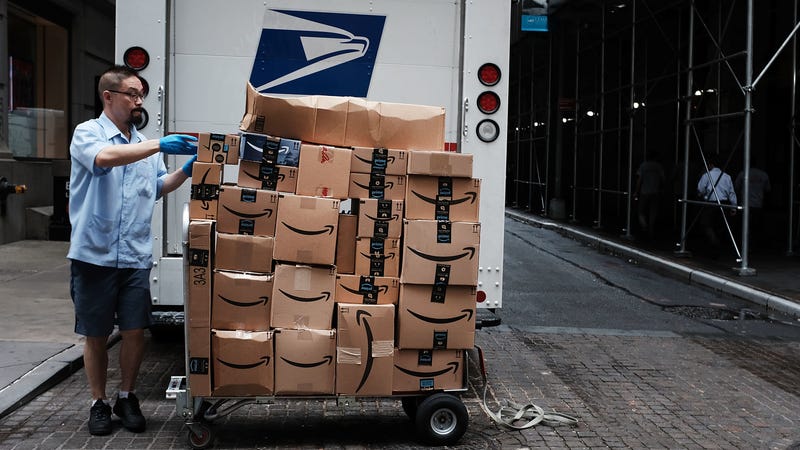 Photo: Getty
Photo: Getty
The Trump administration just announced plans to withdraw from a treaty that oversees global postage rates. The 144-year-old Universal Postal Union (UPU) treaty makes it possible for companies from China and elsewhere to ship small packages directly to consumers in the United States at very low rates, often lower than what American companies could offer. If the withdrawal happens, those cheap Apple knockoff headphones you buy from Shenzhen are about to get more expensive.
While this move appears to be the latest assault in Trump’s trade war with China, the issue of cheap international shipping rates has been smoldering for years. Sometimes referred to as the Postal Illuminati, the UPU is now a United Nations organization that governs the fees paid by national postal services for mail delivered internationally. But beginning in 1969, updates to the UPU treaty have allowed developing countries to enjoy international shipping rates that are lower than what people in countries like the United States would pay. The U.S. Postal Service says that it now costs less to ship small packages (4.4 pounds or less) from China to the United States than it would cost to ship them between many domestic destinations.
This amounts to a crappy situation for a lot of U.S.-based retailers, including not only giants like Amazon but also small businesses. The situation has gotten especially bad for American businesses since the introduction of a special “ePacket” service. This new service grew out of a 2010 agreement between China’s state mail carrier and the United States Postal Service (USPS), and it included the addition of tracking and delivery confirmation, as well as expedited shipping, to U.S.-bound orders from China for a small fee. According to the Washington Post, the ePacket service led to a boom in Chinese e-commerce shipments to the U.S. From 2011 to 2012, the number of small packages sent from China increased nearly three-fold from 9.5 million to 26.8 million. It also led to about $29.4 million in losses for the USPS, since the agency was losing money on each item shipped. Who knows how much damage it did to American retailers.
All that said, it’s never been cheaper or easier for the American consumer to get cheap goods from China. There have even been shopping apps, like Wish, that popped up to take advantage of this new age of cheap shipping. Wish connects American consumers directly to Chinese manufacturers and offers a seemingly endless stream of goods at impossibly low prices. A recent scan of the Wish homepage showed AirPod knockoffs for $4 (shipping $1), a 512GB microSD card for $10 (shipping $3), and an Android tablet for $35 (shipping $9). Arguably on the back of this cheap shipping treaty, Americans can buy electronics from China and get them across the Pacific Ocean for less than the price of a fast food lunch. Wish, meanwhile, is doing so well that the company is putting its logo on NBA jerseys.
It’s so far unclear what the Trump administration’s plans to withdraw from the postal treaty will accomplish. For one, the process won’t be easy or immediate. The New York Times reports that State Department officials will announce plans to ditch the treaty and “self-declare” new terms with China. However, it’s worth pointing out that UPU is a United Nations agency that counts almost every country on Earth as a member. So while the administration doesn’t need Congressional approval to leave the treaty, this task of negotiating new terms will involve about 193 nations in addition to China. The true impact on the American consumer might remain a mystery for years.
For smalltime U.S. retailers, however, getting out of this pesky postal arrangement seems like it could be a win. One outspoken inventor named Jayme Smaldone, for example, has been on a bit of a campaign to end American involvement. Smaldone invented something called the “Mighty Mug,” a cup that was hard to spill, and became incensed that Chinese companies were copying it and shipping those knockoffs to the U.S. for much less than it would cost him to ship his original Mighty Mug. He’s made appearances on NPR, written op-eds for the Wall Street Journal, and even got a shoutout in today’s New York Times coverage. In fact, it seems like the New Jersey entrepreneur might be the guy who came up with the term Postal Illuminati.
This all begs the question of whether those opposed to U.S. involvement in a century-and-a-half-old postal union have really thought things through. As problematic as it might seem, abandoning the treaty that governs international cooperation between postal services is bound to be more complicated than saying, “We’re done.” Following through might cost American consumers a lot of money, too. But it might sound good for Donald Trump on the campaign trail, regardless of whether it happens or not.
[NYTimes]
Share This Story